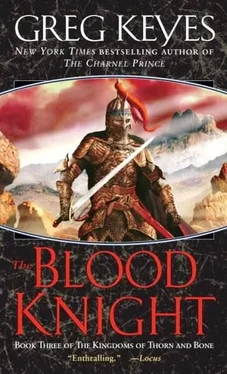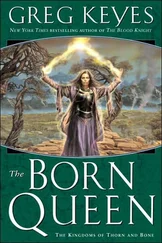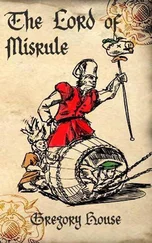He closed his eyes.
Zemlé was certainly right about the terror he felt at the idea of taking command. How could he send anyone to fight and die? And yet what if his other uncertainties were, as she said, merely his way of trying to justify inaction?
After all, Fend and Adhrekh weren’t saying anything terribly different from what Fratrex Pell had said. Maybe it was true. Maybe he was the one who was supposed to do this.
He just hadn’t ever believed it. He had supposed all along that he would find Virgenya Dare’s journal and translate it, and if he found something of use, he would do what he had always done: take it to someone else, someone who would know how to use the information.
And yet, how had that worked out? Desmond Spendlove had used his translations to commit abominable acts. He had given Praifec Hespero the benefits of his research, yet more people had died horribly as a result. Now Hespero was coming to get him .
Maybe it really was time he stopped being the source of someone else’s power. Maybe it was time he took charge.
Zemlé was right. When the threat posed by Hespero had passed, then he would have the leisure to come to a full understanding of his situation. Then he could consider how to deal with Fend.
He took Zemlé by the shoulders and kissed her. She stiffened, and at first he thought she would push him away, but then she loosened up, returning his gesture with enthusiasm.
“Thank you,” he said.
He found the others waiting for him, more or less as he’d left them.
“If you’re serious about this,” Stephen said, “then let it be done. Stop Praifec Hespero—no matter what, don’t let him enter the mountain. Take him captive if you can, but do what you must.”
“Now, that’s the way it’s done,” Fend said. He bowed. “As you command, pathikh, so it shall be accomplished.”
Stephen felt his teeth clench, and he waited, fearing that he had unlocked some secret curse, walked straight into a trap. But nothing happened except that all the other Sefry bowed, too, which was certainly strange enough in its own way.
“Where is the woorm?” Stephen asked.
Fend smiled and made a long, low whistle, and behind him the waters parted. Two great green lamps rose above them all. A faint, appreciative murmur went up among the Sefry, who were clearly collectively insane.
Stephen stumbled back, trying to shield Zemlé with his body.
“Th-the poison!” he stammered.
“Has no effect, here,” Adhrekh assured him. “The sedos power in the mountain creates it harmless. And we have proof against it once we are outside.”
Stephen couldn’t tear his gaze off the thing, but after a long moment he realized they were still waiting for him to say something.
“Fine,” he said. “There’s the woorm. Where are your warriors? How many do you have?”
“There are twelve,” Adhrekh said.
That, finally, was enough to make Stephen look away from the monster to see if the fellow was joking.
“Twelve? But there are more than twelve of you here now.”
“Yes. But most of the Aitivar are forbidden to fight. Twelve will have to be enough. And we have the khriim with us, as well as the khruvk-huryu.”
“The what?” Stephen began, but he was too late. They were already in motion. Fend sang out again, and the great head dipped down so he and Ashem could mount. Adhrekh and eleven other warriors set off at a jog toward the far end of the cavern.
Suddenly Stephen was full of doubt again. Someone was plucking at his sleeve, and he turned to see who it was. It was a Sefry he hadn’t noticed before, one so ancient that even in torchlight Stephen fancied he could see the bones through his skin.
“Pardon, pathikh,” the man wisped, “but do you wish to watch? There is a higher vantage.”
“Yes,” Stephen said. “I think I’d like that a great deal.”
He followed the Sefry, growing uneasier by the moment. He felt like the man in the old story about the Damned Saint who was trapped in a bottle. The man got one wish, and then the saint would kill him. There were only two things he could not wish for: to be spared—or for the saint to die.
“Anne?”
She found Austra shaking her gently.
“I’m fine,” Anne told her friend.
“What happened? You were talking to—it—and then you went still as a statue.”
“Nothing,” she lied. “I’ll tell you later. For the moment, I need you all to stay here and stay still. I have to do something else and must not be disturbed.”
“Very well, Anne.”
“Anne?” Alis whispered weakly.
“Yes, Lady Berrye?”
“Do not trust him.”
“Oh, I don’t,” Anne replied.
Then she settled on the floor, cross-legged. She closed her eyes and imagined she was at the Coven Saint Cer, in the womb of Mefitis. She focused on an invented middle distance and tried to picture a light there, slowing her breathing until it was deep and steady, until she could feel the slow pulse of the tide beneath Ynis and the deeper, secret motions of the earth.
Until she was calm and quiet.
As the light flickered into being, she had a moment when she felt as if she were spreading out, as if the stone and water of Ynis and Newland were becoming her flesh and blood. The Kept ached like a pustule, as did the thing in Eslen-of-Shadows, but that rushed suddenly away as the darkness shattered and she found herself in a forest clearing. Although the sun stood at noon in a brilliant clear sky, she cast no shadow, and she knew that this time she had finally come to the right place.
“Faiths!” she called.
For a moment she thought they might not appear, but then they stepped into the clearing: four women, masked and gowned as if for a costume ball, as similar and as dissimilar as sisters.
The first, on Anne’s right, wore a dress of deepest green and a sneering golden mask. Her hair fell in amber braids almost to her feet. Next to her stood a brunette in a mask of bone and a rust-red dress. The third Faith was as pale as the moon, with silver locks. Her gown and disguise were black. The final woman wore a white mask and a white dress, and her hair was darker than coal.
“You’ve all changed,” Anne noticed.
“As have the seasons, the winds, and you, my dear,” the first Faith said.
“Where have you been?” Anne asked. “I’ve tried to find you before.”
“This sort of visiting has become more difficult,” the bone-masked Faith said. “The thrones are appearing.”
“Yes, the thrones,” Anne said. “One of you once told me that you couldn’t see the future. You said that you were like chirgeons, that you could feel the sickness of the world and sense what was needed to make it well.”
“That’s true,” the black-gowned Faith replied.
“Very well,” Anne said. “What do you feel now? I’m asking for your advice.”
“This is a dangerous time for us to give you advice,” the green-gowned woman replied, spreading her hands. Her sleeves fell back, and Anne noticed something she hadn’t seen in any of her earlier encounters with the Faiths.
“What is that?” she asked.
The woman dropped her hands, but Anne stepped forward.
“It’s all right,” the white-clad sister said. “She had to know sometime.”
Anne caught at the Faith’s hand and felt an odd tingle of contact, as if she held something very slippery. But the arm came up obediently so she could see the mark tattooed there: a black crescent moon.
“I was attacked by a man wearing this mark,” she said. “A follower of yours, perhaps?”
The Faith turned to her sister. “You explain,” she said, “if you’re so certain she should know.”
Читать дальше












